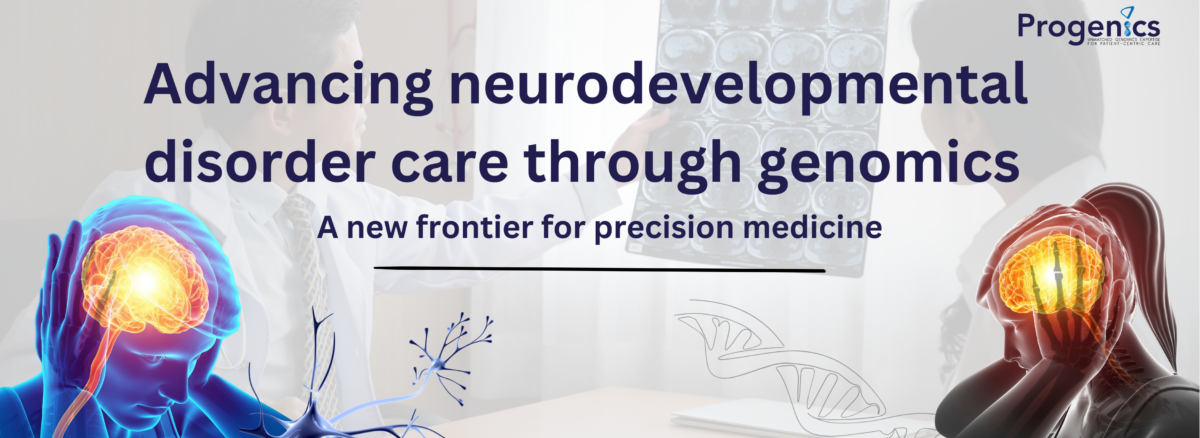Introduction
Neurodevelopmental disorders (NDDs), such as autism spectrum disorder (ASD), intellectual disability (ID), and global developmental delay, affect millions of individuals worldwide. These disorders often carry a significant burden of neuropsychiatric comorbidities, complicating diagnosis and treatment. Recent advancements in genetic testing and genomics-informed medicine have opened a promising path for improving outcomes for individuals with NDDs. By integrating genomic insights into clinical care, precision medicine is reshaping the landscape of neuropsychiatric care, offering personalized solutions that address the unique needs of each patient.
The Genetic Basis of NDDs
To understand NDDs, it helps to think about how our DNA works like a set of instructions for our bodies. These instructions tell our cells how to grow, develop, and function. Sometimes, these instructions have “spelling errors” called mutations or variants. Some of these errors are small and harmless, but others can significantly affect how the brain develops and functions.
NDDs often occur because of a mix of common genetic changes, which might have small effects individually, and rare but impactful mutations. For example, some rare changes in genes can directly disrupt early brain development, leading to conditions like autism or intellectual disability. Advances in genetic testing, such as exome sequencing (which looks at all the protein-coding parts of genes) and genome sequencing (which examines all of the DNA), help doctors find these changes. These tests have shown that about 50% of individuals with severe NDDs have identifiable genetic changes
When a specific genetic cause is identified, it allows doctors to understand the root cause of the disorder. This can improve predictions about the condition’s progression, suggest targeted treatments, and provide families with insights about recurrence risks for future children. For example, identifying a mutation associated with epilepsy might guide doctors to choose specific medications that are more likely to work.
The UCLA CARING Clinic: A Model for Genomics-Informed Care
The UCLA Care and Research in Neurogenetics (CARING) Clinic represents a novel approach to integrating genomics into neuropsychiatric care. This multidisciplinary clinic combines expertise from neurology, psychiatry, medical genetics, and psychology to deliver comprehensive, genomics-informed care to patients with NDDs. Over a five-year period, the CARING Clinic evaluated 316 patients, demonstrating the transformative potential of this model.
Key Findings:
- High Diagnostic Yield: Among the 316 patients evaluated, 246 underwent genetic testing. The results revealed that 41.8% of these patients had pathogenic or likely pathogenic genetic variants. This discovery underscores the importance of integrating genetic testing into routine care for NDDs, as nearly half of the tested patients received actionable genetic diagnoses. The clinic identified 62 distinct genetic disorders, highlighting the remarkable genetic diversity associated with NDDs. Notably, while some conditions, such as Duplication 15q syndrome, were observed in multiple patients, most genetic findings were unique, underscoring the need for personalized care.
- Impact on Clinical Management: The genetic insights gained through testing had direct implications for patient care. For instance, 30.6% of patients with identified variants underwent cascade testing to determine if other family members carried the same genetic mutation. Additionally, 22.2% of families received counselling on reproductive options, enabling them to make informed decisions about future pregnancies. Medication adjustments were made for 13.9% of patients based on their genetic findings, improving the precision of their treatment plans. Furthermore, 2.8% of patients were referred to clinical trials targeting their specific genetic conditions, and 30.6% required new or enhanced medical surveillance to manage associated health risks.
- Enhanced Multidisciplinary Coordination: The clinic’s structure allowed patients to receive comprehensive evaluations from specialists across neurology, psychiatry, genetics, and psychology. This approach not only improved diagnostic accuracy but also ensured that management plans were holistic and tailored to address the complex needs of individuals with NDDs. The collaborative nature of the clinic significantly reduced delays and gaps in care, which are common in traditional, fragmented healthcare models.
- Identification of Rare Conditions: While some genetic conditions were observed more frequently, such as Tuberous Sclerosis Complex and Angelman syndrome, 50 of the 62 diagnoses were unique to individual patients. This finding highlights the increasing recognition of ultra-rare genetic disorders and underscores the importance of broad genomic testing rather than focusing solely on well-known syndromes. Such discoveries pave the way for understanding and managing rare conditions more effectively.
Benefits of Genomics-Informed Care
- Enhanced Diagnostic Accuracy Traditional symptom-based diagnostic models often leave families in a “diagnostic odyssey.” Genomic testing provides definitive diagnoses, reducing uncertainty and enabling more focused interventions.
- Personalized Treatment Plans Genomic insights allow clinicians to tailor treatments based on a patient’s specific genetic profile. For example, identifying a mutation associated with epilepsy can guide anti-seizure medication selection.
- Family and Reproductive Counseling Families benefit from understanding the genetic underpinnings of NDDs, which informs family planning and the potential for recurrence in future offspring.
- Access to Emerging Therapies Patients with rare genetic conditions are often eligible for clinical trials or gene-specific therapies, offering hope for conditions previously deemed untreatable.
Challenges in Implementation
While the promise of genomics-informed care is undeniable, several challenges must be addressed:
- Insurance Barriers: Genetic testing remains inconsistently covered, limiting access for many families.
- Workforce Training: Clinicians require specialized training in genomics to effectively interpret results and guide management.
- Equity in Access: Patients from underrepresented and low-socioeconomic backgrounds face disparities in accessing advanced genomic care.
The Path Forward
To fully realize the potential of genomics in NDD care, systemic changes are needed:
- Expanding Education in Genomic Medicine Medical training programs should emphasize core principles of genomic medicine, equipping future clinicians to manage the growing population of patients with rare genetic disorders.
- Develop Inclusive Care Models Clinics should adopt models that address the needs of diverse populations, incorporating telemedicine and outreach programs to reduce geographic and financial barriers.
- Strengthen Multidisciplinary Networks Enhanced collaboration between specialties ensures comprehensive and coordinated care, particularly for complex cases.
- Advocate for Policy Change Advocacy efforts should focus on improving insurance coverage for genetic testing and supporting research into precision medicine therapies.
Conclusion
The integration of genomics into neurodevelopmental disorder care marks a paradigm shift in medicine. By adopting a genomics-informed approach, clinicians can provide more precise, effective, and personalized care, addressing the unique needs of individuals with NDDs. The UCLA CARING Clinic exemplifies how multidisciplinary, precision medicine can transform patient outcomes, offering a model for healthcare systems worldwide.
For low- and middle-income countries (LMICs) like India, the potential of genomics-informed care is particularly profound. With high population density and limited healthcare resources, integrating genomics into NDD care could streamline diagnoses and reduce the burden on overstretched medical systems. Initiatives focusing on affordable genetic testing, community-based genomic education, and scalable telemedicine solutions can enable widespread adoption. Moreover, leveraging partnerships with global research institutions could provide access to cutting-edge technology and training for healthcare professionals in India.
The future of NDD care in LMICs lies in creating a model that is not only technologically advanced but also cost-effective and accessible. By prioritizing collaborations, policy reforms, and community engagement, countries like India can harness the transformative power of genomics to improve outcomes for millions of individuals with NDDs.


